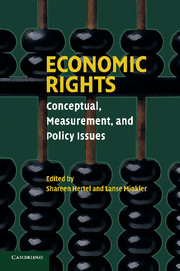Book contents
- Frontmatter
- Contents
- Contributors
- Acknowledgments
- 1 Economic Rights: The Terrain
- SECTION I CONCEPTS
- 2 The West and Economic Rights
- 3 Needs-Based Approach to Social and Economic Rights
- 4 Economic Rights in the Knowledge Economy: An Instrumental Justification
- 5 “None So Poor That He Is Compelled to Sell Himself”: Democracy, Subsistence, and Basic Income
- 6 Benchmarking the Right to Work
- SECTION II MEASUREMENT
- SECTION III POLICY ISSUES
- APPENDIX 1 Universal Declaration of Human Rights
- APPENDIX 2 International Covenant on Economic, Social, and Cultural Rights
- Index
- References
2 - The West and Economic Rights
Published online by Cambridge University Press: 18 December 2009
- Frontmatter
- Contents
- Contributors
- Acknowledgments
- 1 Economic Rights: The Terrain
- SECTION I CONCEPTS
- 2 The West and Economic Rights
- 3 Needs-Based Approach to Social and Economic Rights
- 4 Economic Rights in the Knowledge Economy: An Instrumental Justification
- 5 “None So Poor That He Is Compelled to Sell Himself”: Democracy, Subsistence, and Basic Income
- 6 Benchmarking the Right to Work
- SECTION II MEASUREMENT
- SECTION III POLICY ISSUES
- APPENDIX 1 Universal Declaration of Human Rights
- APPENDIX 2 International Covenant on Economic, Social, and Cultural Rights
- Index
- References
Summary
The West is regularly presented as indifferent, even hostile, to economic, social, and cultural rights. Economic and social rights “are largely dismissed in the West.” “Philosophically the Western doctrine of human rights excludes economic and social rights.” “The dominant Western conception of human rights …emphasizes only civil and political rights” (Chomsky 1998, 32; Pollis 1996, 318–19; Muzaffar 1999, 29; compare Pollis & Schwab 1979, xiii; Wright 1979, 19; Henry 1996, xix; Felice 2003, 7; Senarclens 2003, 141). This story often takes a “three generations, three worlds” form: successive generations of civil and political, economic, social, and cultural, and peoples' rights being championed by the West, the socialist countries, and the Third World, respectively (Vasak 1984; Vasak 1991; Marks 1981; Berting 1990, 197–201; Flinterman 1990; Mbaye 2002, 47–48; Smith 2003, 46–47; Tomuschat 2003, ch. 3; Ishay 2004, 10–11, ch. 2–4; compare Galtung 1994, 109, 151–54). In this telling, economic and social rights were largely forced on a resistant West, which not only continues to pursue a one-sided emphasis on civil and political rights but has intensified this narrowness in recent years (Evans 2001, 57, 60–61; Otto 2001, 55; Puta-Chekwe & Flood 2001, 41; Felice 2003, 7).
This standard story, which I label the myth of Western opposition, has virtually no basis in fact. The first three sections of this chapter demonstrate this by examining the Western role in the development of international human rights norms.
- Type
- Chapter
- Information
- Economic RightsConceptual, Measurement, and Policy Issues, pp. 37 - 55Publisher: Cambridge University PressPrint publication year: 2007
References
- 6
- Cited by



